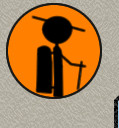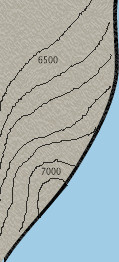

What to do, or not to do, while on the trail
There are many things that you should do, and not do, while backpacking, but this focuses on a few areas I feel are important to note.
 Do
not deface anything. This includes trees, rocks, signs, benches, tables,
trash cans, the trail, etc. The whole reason you go out on the trail is
to see what is out there in its natural condition. No one wants to see
a carving of your initials in a tree or written on a rock. Here is an
example of what happens once one person decides to carve on a tree. I
do not understand why once one person defaces a tree everyone else, that
might have walked by this tree, decides that they have to put their message
on there as well. Please do not succumb to the peer pressure and leave
the natural beauty intact. Let a ranger know about any damage done to
the area you are in. They will appreciate it, and work on correcting it.
Do
not deface anything. This includes trees, rocks, signs, benches, tables,
trash cans, the trail, etc. The whole reason you go out on the trail is
to see what is out there in its natural condition. No one wants to see
a carving of your initials in a tree or written on a rock. Here is an
example of what happens once one person decides to carve on a tree. I
do not understand why once one person defaces a tree everyone else, that
might have walked by this tree, decides that they have to put their message
on there as well. Please do not succumb to the peer pressure and leave
the natural beauty intact. Let a ranger know about any damage done to
the area you are in. They will appreciate it, and work on correcting it.
 Make
sure to pack out more trash than you pack in whenever possible. Yes, I
said more than what you pack in. There is always an opportunity to pick
up a stray gum wrapper or plastic baggie that managed to get away from
a fellow backpacker. Do not just walk by it, pick it up and put it in
your pocket. At camp make sure to police the area while you are there,
and thoroughly while you are leaving to make sure you pick up anything
that doesn't belong there, regardless of if it was yours or not. As a
side note make sure you are not relying on someone else to pick up after
you by securing anything you might lose on the hike in or out. I use ziploc
freezer bags as my trash bags. Here is one from a recent trip.
Make
sure to pack out more trash than you pack in whenever possible. Yes, I
said more than what you pack in. There is always an opportunity to pick
up a stray gum wrapper or plastic baggie that managed to get away from
a fellow backpacker. Do not just walk by it, pick it up and put it in
your pocket. At camp make sure to police the area while you are there,
and thoroughly while you are leaving to make sure you pick up anything
that doesn't belong there, regardless of if it was yours or not. As a
side note make sure you are not relying on someone else to pick up after
you by securing anything you might lose on the hike in or out. I use ziploc
freezer bags as my trash bags. Here is one from a recent trip.
Never camp right next to someone while backpacking. For most of us we go out to the wilderness to get away from everything, and sometimes that includes people. If you happened to come over to my camp and say hi, or had a question, or needed something, I would chat with you (and maybe invite you back later on to hang out). BUT, if you camp right next to me I am forced to listen to you and your group the whole time you are there. That might not be what I want to do. Usually there is enough space around lakes and streams to leave a nice buffer zone between you and whomever might be camping in the same area. Also worth noting is sound can carry well (while you are out near a lake especially) So be aware of your noise level (especially at night).
Always leave a spare shirt, shoes and socks, and water in the car. When you have done a good deal of mileage to get back to the car you will be sweaty and dirty, and there is no reason you have to wear that shirt all the way home. There is also no reason why you should have to sit next to the guy, or girl, in that shirt they have lived in for the past # days. Your feet could be sore/wet so having a fresh pair of socks and tennis shoes or sandals in the car can make you feel 100% better. If you are driving it is also sometimes hard to drive with big mountaineering boots on. Water is something that you simply should never run out of. I know that on the way out to the car it is easy to simply push for the trailhead instead of stopping for water. Having some in the car assures that you can at least re-hydrate on the way home. I recommend never running out of water on the trail though, as you can never really be sure when your hike is done. You could become injured and not make it to the car when you plan to, or the car might not be there when you reach your trailhead.
Always pack a wide brimmed hat. Keeping the sun off your head is a must. Do not leave home or the trailhead without one. I use mine for sun protection and for keeping bugs off of me by spraying bug spray on the hat and then putting it on. I try to limit the amount of bug spray I directly apply to my skin, and this is one way of limiting how much I have to spray my head.


